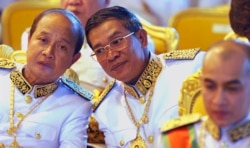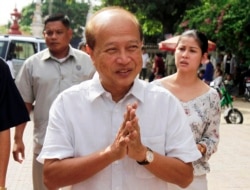Funcinpec spokesperson Phan Sithy held a press conference on January 19 to make a major announcement for the royalist party. Prince Norodom Ranariddh will return as president of the near-irrelevant political party and lead it into the 2022 commune election and the 2023 national ballot.
The prince has kept a low profile after a fatal car accident in Preah Sihanouk that killed his wife, Ouk Phalla, and left the former prime minister seriously injured in June 2018. Since the accident, the prince has shuttled between Phnom Penh and Paris, France, to get treatment and recuperate.
His return to politics has raised questions if the Funcinpec party can attract its old vote base - which was loyal to Ranariddh's father, late King Norodom Sihanouk and founder of the party.
Another lingering suspicion is whether Ranariddh and Funcinpec will be used as a prop by the ruling Cambodian People’s Party to support the latter's dubious claims of having a multiparty, liberal democracy in the country.
Phan Sithy dismissed both suggestions. The party does not have a loyal voter base, he claimed, because there was grassroots support for Funcinpec.
“After we went to visit the people as part of our experiment, we saw that people still have the prince and the royalist party Funcinpec in their hearts,” he said.
But past electoral performances are at odds with Phan Sithy’s claims. The party won zero seats in the 2018 national election, garnering no more than 6 percent of the popular vote. This was a slight improvement from the 3.6 percent vote share it had in 2013 - again when it did not win a single parliamentary seat.
Funcinpec enjoyed a fleeting presence in the National Assembly in 2017 after the Cambodia National Rescue Party was dissolved, accepting 42 of the CNRP's 55 seats in parliament. Similarly, Funcinpec got around 230 commune positions when the CNRP’s 5007 local seats were redistributed in 2017.
The drop in electoral fortunes is in stark contrast to the UNTAC-administered 1993 election, when Funcinpec won the most seats in the National Assembly, only to be forced into a power-sharing arrangement with Hun Sen.
Em Sovannara, a political science professor in Cambodia, said the Ranariddh-led party had likely lost the voters’ confidence after it did not hesitate to accept the redistributed CNRP seats.
"I think there is no support for him if he comes back,” Em Sovannara said. “The political values of this party’ politicians have drifted away from the hearts of the people,” he said.
Sovannara’s views are also reflected in the tenuous relationship Ranariddh has had with his party. The prince was made party president in 1992 and led it to victory in the 1993 elections. He also oversaw the splintering of the party and loss of senior leaders, most notably Funcinpec’s Finance Minister Sam Rainsy during the first National Assembly mandate.
He left the party in 2006, following factionalism, to form the Norodom Ranariddh Party, winning two seats in the 2008 general election. He then returned to Funcinpec in 2015, leading the party to a winless election in 2018.
Phan Sithy continued to dispute that the party’s fortunes were waning, pointing to the “400,000” votes they received in 2018, putting them in second place.
They were behind the CPP, which got 4.8 million votes and were unable to muster enough votes to leapfrog the nearly 600,000 spoiled ballots – many of which were protest votes for the dissolved CNRP.
“With regards to the current political events, I still think that the royalist party Funcinpec would be able to garner votes in this mandate because the situation seems to be beneficial for our party,” he said.
Phan Sithy added that Prince Ranariddh would return to Cambodia ahead of the 2022 commune election to lead the party’s campaign to increase its commune chief tally.
Ear Sophal, professor of diplomacy and international affairs at Occidental College in Los Angeles, said Funcinpec lacked the electoral might to challenge the CPP, unlike the CNRP which was an electoral threat for the ruling party.
“I do not believe the prince’s political party is a real opposition party. It’s an extension of the ruling party, plain and simple,” Sophal said.
“So far, the CPP only dissolved the CNRP, which means that it was the CNRP that scared the CPP the most.”
Sophal alleged that it was likely the CPP could bankroll Funcinpec’s electoral campaign, an allegation quickly dismissed by party spokesperson Phan Sithy.
The prince’s return has not rattled existing or new parties hoping to take on the mantle of the principal opposition to the CPP.
Ou Chanrath, a close Kem Sokha ally and who recently founded the Khmer Reform Party, dismissed Funcinpec’s and Ranariddh’s prospects at the upcoming elections.
He said the prince’s acceptance of the CNRP’s National Assembly seats, following its dissolution, had hit Ranariddh’s reputation with voters. He also questioned Ranariddh’s ability to campaign and muster support for Funcinpec.
“The ordinary person is already aware of who can challenge [the CPP] and lead an opposition party,” Ou Chanrath said.
Meach Sovannara, another former CNRP official, questioned if Ranariddh would be able to resonate with Cambodia’s young voters – many of whom were a critical vote base for the CNRP in 2013 and 2017.
Meach Sovannara, another former CNRP official, questioned if Ranariddh would be able to resonate with Cambodia’s young voters – many of whom a critical vote base for the CNRP in were 2013 and 2017.
“The modern youth keep abreast of the news on Facebook; they are well educated,” he said. “So, they seek a leader who has courage, is highly educated, and in good physical shape.”











